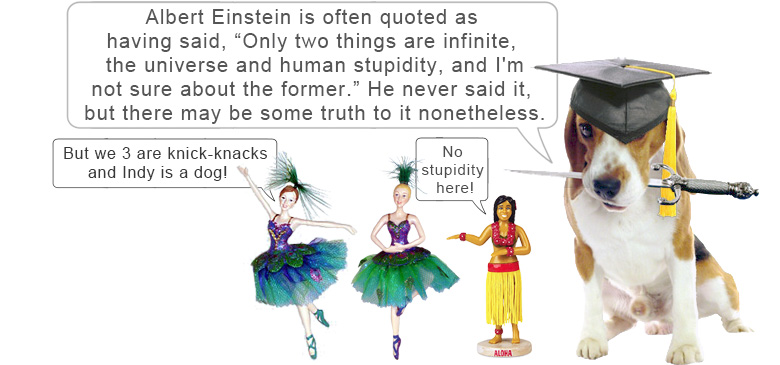Your assumptions about the intelligence of your customer will colorize and slant your ad writing in ways of which you are not even aware.
Is the customer stupid?
The writer of the 139th Psalm did not believe that customers are stupid. He said to God, “I will praise you; for I am fearfully and wonderfully made.”
Harvard University Medical School made a 3-minute film that illustrates the idea that we are “fearfully and wonderfully made.” It’s called The Inner Life of a Cell, and Indy Beagle has embedded it on the first page of the rabbit hole for you. To enter the rabbit hole, all you have to do is click the image of Indy at the top of the Monday Morning Memo.
In the book, Wizard’s First Rule by Terry Goodkind, we read,
“Wizard’s First Rule: People are stupid; given proper motivation, almost anyone will believe almost anything. Because people are stupid, they will believe a lie because they want to believe it’s true, or because they are afraid it might be true. People’s heads are full of knowledge, facts, and beliefs, and most of it is false, yet they think it all true. People are stupid; they can only rarely tell the difference between a lie and the truth, and yet they are confident they can, and so are all the easier to fool.”
When you make unsubstantiated claims, or if you “substantiate” your claims with sophistry, false facts, overstatements or hyperbole, you are writing under the assumption that people are stupid. But a lot of money has been made by giving gullible people false hope. When a person deeply wants to believe that what you are saying is true, they will believe it, in spite of the fact that you are lying.
The assumption that people are stupid will help you write more effective political advertising, direct response advertising, and television infomercials. It will also help you build your downline in multilevel marketing.
But conning stupid people out of their money is like beating up little children. I can do it, I just don’t want to.
There are two ways to write ads that target intelligent people. The first way is to immediately substantiate your claim with highly credible evidence each time you make a statement of benefit.
EXAMPLE: Black Diamonds. Exotic. Rare. And Beautiful. A star exploded and sent an asteroid hurtling toward our galaxy a long time ago. That asteroid was more than half-a-mile wide, and it flew through space until it struck the earth. That asteroid was made of black diamonds. The National Science Foundation announced the news about these outer-space diamonds and then the New York Times wrote a story about them. Black Diamonds. Exotic. Rare. And Beautiful.
The second way to advertise to intelligent persons is to use “Magical Thinking,” a style of writing characterized by elements of the impossible woven with a deadpan sense of presentation into an otherwise true story. Magical Thinking goes beyond the realm of exaggeration and moves into the realm of entertainment.
EXAMPLE: Life is happier when it’s less cluttered. Your house will be bigger! Your teeth will be whiter! Angels will sing! You’ll be a better dancer. Go to 1-800-GotJunk.com and prepare to be amazed.
If you make untrue statements and expect them to be believed, you are writing to a stupid person. But if you make untrue statements for the purposes of entertainment – knowing they will not be believed – you are writing to an intelligent person.
If I provided an example of advertising filled with strong assurances, baseless claims, puffery and hyperbole with no evidence to support those claims, you would say, “Wow. I hear ads like that every day.”
And now you know why people are so very annoyed by most advertising.
Roy H. Williams
 Beth Harmon was the fictional chess prodigy who captured the hearts of millions of viewers by winning the world chess championship in the popular 2020 Netflix miniseries, “The Queen’s Gambit.” Elliott Neff is a real Chess Federation National Master who helps disadvantaged people discover valuable life lessons through the game of chess. Two years before America fell in love with Beth Harmon, Elliott Neff explained to roving reporter Rotbart how chess teaches sportsmanship, good decision-making, patience, planning, and how to learn from our mistakes. Would you like to checkmate your business competitors? Listening to this week’s “Best of Monday Morning Radio” episode would be a smart opening move. We’ll start when you arrive at MondayMorningRadio.com
Beth Harmon was the fictional chess prodigy who captured the hearts of millions of viewers by winning the world chess championship in the popular 2020 Netflix miniseries, “The Queen’s Gambit.” Elliott Neff is a real Chess Federation National Master who helps disadvantaged people discover valuable life lessons through the game of chess. Two years before America fell in love with Beth Harmon, Elliott Neff explained to roving reporter Rotbart how chess teaches sportsmanship, good decision-making, patience, planning, and how to learn from our mistakes. Would you like to checkmate your business competitors? Listening to this week’s “Best of Monday Morning Radio” episode would be a smart opening move. We’ll start when you arrive at MondayMorningRadio.com
